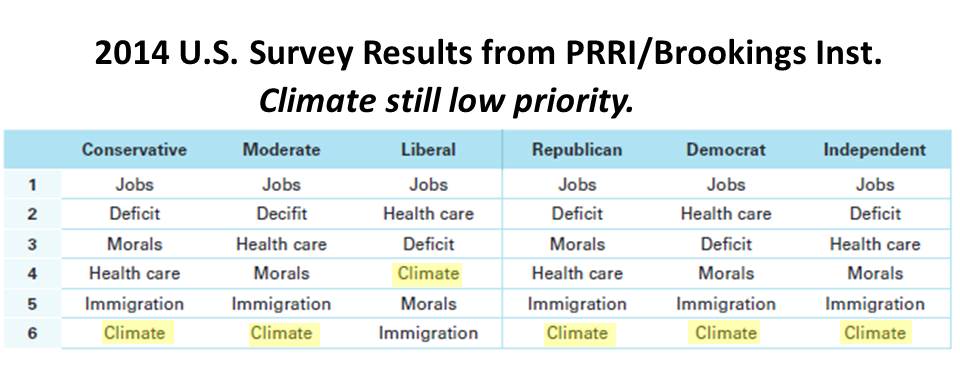1. Antarctic Sea Ice at Record Extent
Last month set a record for sea ice extent for the month of May since satellite records started in 1979. The trend for average monthly sea ice extent for the southern hemisphere has been steadily on the rise. See here for more.

2. Brookings Institute survey shows voters of all stripes care little about global warming
The latest survey from the Brookings Institute shows climate at the bottom of voters’ concerns. This is true for all groups except for those who label themselves as liberals, and even they rank it 4 out of 6. Here is Roy Spencer’s commentary on the poll.

3. Farm Bureau takes on EPA’s new land grabbing water rules
Don’t let anyone fool you. The EPA’s new rules under the Clean Water Act in reality have little to do with water. Their purpose is to put as much land as possible under government control. Here’s the Farm Bureau’s singing commentary.
4. Do the US warm-mongers want us to ape Germany?
This article by Indiana Senator Dan Coats points to Germany as the future for American energy consumers — i.e. all of us.
When its legislature passed a renewable-energy law in 2000, Germany gave solar and wind producers 20 years of fixed high prices and preferred access to the country’s electricity grid. This scheme of government intrusion, subsidies and market manipulation set the stage for even worse government decision making regarding energy policy…German leaders vowed to eliminate clean nuclear power while simultaneously aiming to reduce carbon emissions by 80 to 95 percent by 2050.
These overly ambitious and seemingly contradictory targets are to be achieved by an extravagant government plan to encourage the development of renewable energy production methods. Under this plan — called "Energiewende," or "energy transition" — renewables, mostly solar and wind, would supply 80 percent of Germany’s electricity and 60 percent of the country’s total energy requirements.
If those goals look impossible, that’s because they are. Germany’s ongoing subsidization of alternative energy industries means Germans pay energy prices at least two to four times higher than the global average.
Regular middle-class households bear by far the greatest share of this onerous cost burden, since industries themselves are heavily subsidized.
Earlier this year, the German government revealed that 6.9 million families are in energy poverty, which is defined as spending at least ten percent of household income on energy expenses. Today, German citizens complain loudly about these extra costs, costs that Americans…do not yet face.
If anyone thinks that this is not part of President Obama’s plan for the US, here is what he had to say in 2008.
Under my plan…electricity rates would necessarily skyrocket…Because I’m capping greenhouse gases, coal power plants, you know, natural gas, you name it — whatever the plants were, whatever the industry was, they would have to, uh, retrofit their operations. That will cost money. They will pass that money on to consumers.
Click here for the Economics & Environment Update archive.
You can unsubscribe to this and all future e-mails from the John Locke Foundation by clicking the "Manage Subscriptions" button at the top of this newsletter.



